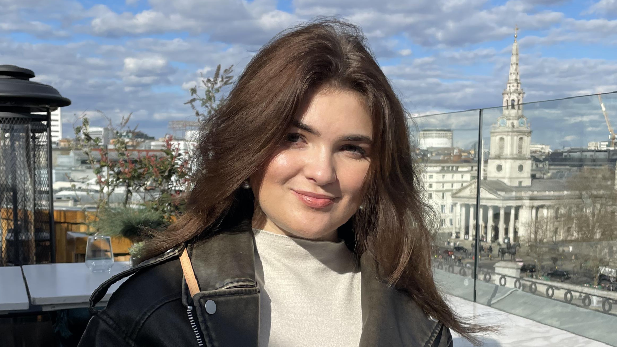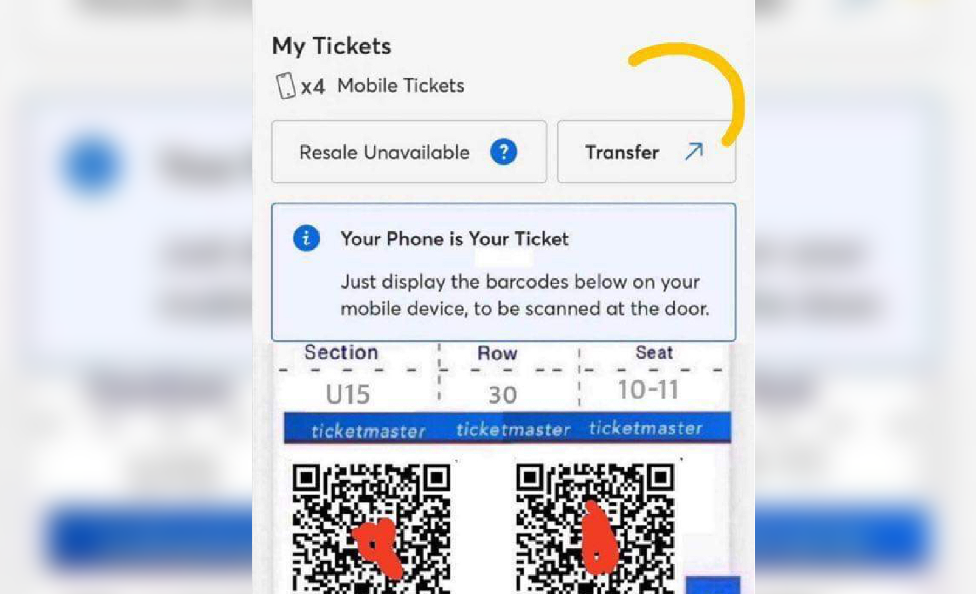Coldplay fans scammed buying second-hand tickets

Niamh Thomas lost £250 after being scammed by a fake seller on Facebook
At a glance
Three fans say they were scammed trying to buy tickets to see Coldplay in Cardiff
A 19-year-old student lost £250 buying two tickets from a Facebook group
Those posing as sellers blocked buyers after money was transferred
Consumer rights group Which? explains how to avoid being scammed online
- Published
Three Coldplay fans have said they fell victim to scammers when trying to buy second-hand tickets to the band's Cardiff shows.
Niamh Thomas, 19, lost £250 trying to buy two tickets on a Facebook group.
Meanwhile, Sian Thomas was blocked on social media by a seller as soon as she transferred them £210.
They are urging fans looking for tickets for next year's Taylor Swift and Foo Fighters concerts to be careful.
Are Coldplay fans as eco-conscious as the band?
- Published8 June 2023
Mindboggling to join Coldplay on stage, choir says
- Published7 June 2023
Niamh, from Swansea, said she was "desperate" to see Coldplay and spent all day looking for tickets.
She found someone on a Facebook group selling two tickets, who said they could no longer go, and was satisfied the account was "legit".
The Cardiff University student transferred £75 for each of the standing tickets, plus an extra £100 for what the seller said was to change the name on each of the tickets.
She said: "I did start to worry, but I didn't know how Ticketmaster worked so I sent the money."
The seller then blocked her, leaving Niamh down £250.
"I was horrified and so annoyed at myself."
She said she contacted her bank to see if she could recover the money, but because she willingly sent it to a British account it was "very unlikely" she would get it back.

Sian Thomas (left) was scammed £210 for two Coldplay tickets, after buying from a fake seller on Facebook
Sian, 43, from Bridgend, also lost more than £200 to a seller on a Facebook group who claimed they could no longer go to the concert.
The seller told her she would exchange the tickets on Ticketmaster as soon as they received £210 for the two tickets.
But as soon as the money was sent, Sian was blocked by the seller.
She later found out four other people had been scammed by the same person.

Sian was sent a fake screenshot of the non-existent tickets by the scammer before she sent the money
Sian said her bank, Barclays, helped her to get her money back. She was subsequently able to buy some legitimate tickets and go to the "brilliant" concert.
She said: “I'm always that friend that just transfers the money and turns up but this time I thought I'd be helpful.
“I’m never organising anything again! My friends won’t let me!”

Olivia Blandford sent money to a fake seller through PayPal
Nineteen-year-old Olivia Blandford, from Aberdare, Rhondda Cynon Taf, was also scammed.
She joined a Facebook group for buying and selling concert tickets with hundreds of members.
She said the group administrators posted daily reminders about being careful and advised buyers to check with them before paying.
Olivia sent an admin member a few different accounts she was hoping to buy tickets from and was told they were all scammers.
The group admin then personally offered to help her to find some tickets, and when they said they had found some, requested money through a bank transfer.
Olivia requested to go through PayPal instead, agreeing to pay a £35 deposit before transferring the rest of the money when she had the tickets.
However, she was asked to use PayPal's friends and family option, which does not offer buyer protection.
She said this was a "big mistake".
Despite sending a screenshot confirming the money had been sent, the seller claimed the money had not gone through.
Olivia was then removed from the Facebook group when she refused to send more money.
She then received an email from PayPal confirming the payment, made in pounds, had been converted to US dollars.
Olivia said: "I was lucky enough to have only sent a small deposit.
"I was honestly gutted and I just can’t believe people can be that low.
"It's worrying because others might have actually sent the full amount."
How to avoid online scams
Lia Webb from consumer group Which? said fraudsters use "any hook they can to try to steal money".
Her advice includes:
If a deal on social media seems too good to be true, it often is
Always try to buy tickets through an official seller
Thoroughly research secondary sellers to make sure they are genuine
If you believe you have been scammed, report it to Action Fraud and your bank immediately
If you paid via debit card, you may be able to claim money back through the chargeback scheme
If you paid via credit card, you can use a section 75 claim if the value is more than £100